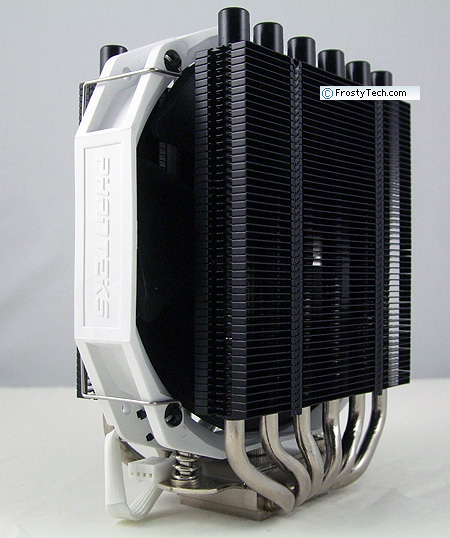
TOP 5 Heat Sinks TOP 5 Low Profile Heat Sinks TOP 5 Liquid Coolers
Heatsinks by Brand / Mfgr Reviews + Articless Advanced Search
 |
TOP 5 Heat Sinks TOP 5 Low Profile Heat Sinks TOP 5 Liquid Coolers Heatsinks by Brand / Mfgr Reviews + Articless Advanced Search |
frostytech's socket LGA2011 Intel synthetic thermal test platform stresses socket LGA2011/1366 compatible heatsinks with a 200W heat load. Keep in mind that the AMD Integrated Heat Spreader and Intel LGA2011 Integrated Heat Spreader both measure ~38x38mm, so these test results can be extrapolated to AMD processor scenario's as well.  With a 200W heat
load applied by the Intel LGA2011/1366 version of FrostyTech's synthetic thermal test platform, the Phanteks PH-TC14S
heatsink is able to maintain a fairly average temperature test result of 24.2°C
over ambient at stock fan speed (1600RPM / 47.4dBA). With a 200W heat
load applied by the Intel LGA2011/1366 version of FrostyTech's synthetic thermal test platform, the Phanteks PH-TC14S
heatsink is able to maintain a fairly average temperature test result of 24.2°C
over ambient at stock fan speed (1600RPM / 47.4dBA).
Slowing the speed of the internal 140mm fan to 500RPM will drop noise output to a nearly silent 39.0dBA but causes temperatures to increase to an unsatisfactory 39.0°C over ambient. Conclusions Considering the PH-TC14S's synthetic thermal test results, I think it's safe to say; 1) this heatsink is best suited to 95W TDP processors, 2) painting the aluminum fins black may improve aesthetics but also increases thermal resistance which is not desirable, 3) the slightly convex nickel plated copper base plate will bottleneck heat transfer from the IHS, unless the CPU IHS is slightly concave too. While it's commendable that Phanteks have produced a narrow CPU heatsink for the increasingly constrained space on Intel LGA2011-3 and LGA115x motherboards, it's a crying shame the designers opted to paint the aluminum fins black. To add insult to injury, the painted aluminum fin-to-nickel plated heatpipe joints are loose to the extent the bottom fins can be shifted back and forth! Ideally, cooling fins should be swaged onto the heatpipes with a firm metal-to-metal joint, or better yet, soldered in place. Given these perplexing thermal design choices we can only conclude the Phanteks PH-TC14S is a vanity heatsink... it takes one step forward with the much needed narrow profile and two steps back with questionable fin to heatpipe bonding and other manufacturing choices. While the Phanteks PH-TC14S heatsink does yield good sub-95W TDP thermal performance, it's a heatsink we do not recommend for higher wattage processors. Related Articles: The Top 5 best heatsinks for low noise and low temperature are ranked here. For more reviews on the latest heatsinks and cooling solutions, rely on FrostyTech's inventory of 400+ heatsink reviews. Here are a few other articles that you might enjoy as well. - ID-Cooling SE-214X Heatsink Review
|
|
||||||||||||||||||||||||||||||||||||||||||||||||||||||||||||||||||||||||||||||||||||||||||||||||||||||||||||||||||||||||||||||||||||||||||||||||||||||||||||||||||||||||||||||||||||||||||||||||||||||||||||||||||||||||||||||||||||||||||||||||||||||||||||||||||||||||||||||||||||||||||||||||||||||||||||||||||||||||||||||||||||||||||||||||||||||||||||||||||||||||||||||||
|
Find a Heatsink . Latest Heatsink Reviews . Top 5 Heatsinks Tested . Top 5 Low Profile Heatsinks . Top 5 Liquid Coolers . Heatsinks by Mfgr / Brand |
Social Media |
FrostyTech.com Info . Feedback . Contact Us / Heatsink Submissions . Submit News . Privacy Policy |
 | |
© Copyright 1999-2025 www.frostytech.com All Rights Reserved. Privacy policy and Terms of Use Images © FrostyTech.com and may not be reproduced without express written permission. Current students and faculty of accredited Universities may use Frostytech images in research papers and thesis, provided each image is attributed. | ||||